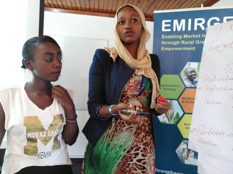 Written by: Mark Matabi, Co-operatives Specialist / Country Lead, EMIRGE Kenya The international image of the Kenya’s co-operative is glorious. The co-operative movement in Kenya is ranked first in the continent and seventh globally. The Internal Co-operative Alliance indicate that the movement contributes to about 45% of the national GDP. However, if the recent local media reports of dismal performances and leadership dishonesty cases in agricultural, housing and financial co-operatives; are anything to go by, then the movement may be gloomier, eroding the very socio-economic brightness that was celebrated before. The ‘co-operators’ being swindled for their hard earned monies with air-filled promises by ‘co-operatives’, are now becoming the order of the day. Issues of member equity, trust, satisfaction and co-operative performance should be under the stakeholders’ radar, more now than ever before. What is more, the devolution of the co-operative function to the county government, should correct the ‘deformities’. In short, Kenya’s co-operative movement needs ‘structural surgery’ – a paradigm shift in focus. Non-governmental organizations (NGOs) including Global Communities, cannot be left behind in the ‘theatre room’ as the key co-operatives’ promoter since economic liberalization in early 1990s. USAID is one of the key donor agencies funding co-operative strategy for rural economic development, and their tenets of development resonate well with the co-operatives principles. USAID implementation of such donor funded programs, needs to be innovative in developing strong and sustainable co-operative structures as vehicle for development. Global Communities is implementing one of the USAID funded programs dubbed ‘Enabling Marketing Integration through Rural Groups Empowerment’ (EMIRGE) since 2016. The principle of this program in Kenya is that, no one should be doing the same thing all the time and expect different results. The recent concerns of some of the co-operatives’ underperformance, dormancy, and scandals in Kenya are attributed to leadership. But is leadership the main essence of the development of co-operatives? Not burying our heads in the sand as co-operative promoters, the emerging question is the whereabouts of followership – the capacity and willingness of members to follow leaders in current co-operatives’ stressed situations. Followership is becoming a greater missing link in the co-operatives development than leadership. The shift of focus from co-operative leadership to followership is therefore critical. This is because co-operative success cannot be solely dependent on dynamic leaders, it also needs followers who are actively contributing to the betterment of the co-operative. The consideration of an effective followership should be the emphasis for partner NGOs, and indeed Global Communities’ emphasis, to create an everlasting impact in co-operative movement. The followership concept was advanced by Robert Kelley, featured in his writings, ‘In praise of followers’, ‘the power of followership’, and ‘rethinking followership’. It is an interactive role that individual members play to complement the leadership in achieving co-operative performance. Key dimensions of followers are active or passive engagement, and/or critical or dependent thinking. The followership dimensions are rooted in self-determination theory, and are in tandem with the first three co-operative principles of open and voluntary membership, autonomy and independency, and member economic participation. When practiced, individuals have inherent growth tendencies and are motivated behind the choices that they make without any external influence and interference.  In strengthening co-operatives in Kenya, USAID/EMIRGE program is building the capacities of co-operative members, for effective followership. The co-operatives are now boasting member-followers who are able to engage in independent critical thinking, analyzing the information given to them, meticulously evaluating situations and actions, and making judgements independent of the consequences of their decisions. Furthermore, the co-operative members are being educated to be actively engaged in taking initiative, assume ownership, and actively assume and participate in performing their co-operative roles. They are doing so even beyond their minimum role requirements and exert considerable effort to accomplish high-quality goals. This is increasing satisfaction through regular attendance of meetings, organizational commitment through share contribution, and fewer membership withdrawals. There is increased self-esteem among the co-operators, and personal growth into mature and effective performers. The co-operatives member-followers have found a reason and strength to complete given tasks, working effectively with others, seeing themselves as important resources, and embracing change, without influence from other people or situations. They are building trust on core values, with their word as their bond. They are able to communicate courageously, with honesty and timely feedback. They are able to identify with their leaders as their ‘partner in success’, and even adopting the leader’s vision (seeing the big picture from the boss’s perspective). This has enhanced the co-operatives’ structural, relational and cognitive social capital dimensions.
2 Comments
8/1/2023 03:14:31 am
Total Group International has been providing enterprise-level IT support in Hertfordshire and surrounding areas for over 20 years. Our dynamic team of IT specialists helps to support a range of sectors from recruitment to finance.
Reply
8/21/2023 11:14:44 pm
Registering a business is a multi-step process that requires researching the business name, filing paperwork, and obtaining licenses and permits. The specific steps and documents required vary depending on the type of business and the state in which the business is located. It is important to research all applicable regulations and ensure all paperwork is filed correctly.
Reply
Leave a Reply. |
AboutThis blog is authored by professionals working in various parts of the developing world to strengthen co-operatives. Archives
December 2017
Categories |
|
© COPYRIGHT 2015. ALL RIGHTS RESERVED.
|
Designed and Managed by EcoVentures International
|
This website is made possible by the support of the American people through the United States Agency for International Development (USAID). The contents of this website are the sole responsibility of Global Communities and do not necessarily reflect the views of USAID or the United States Government.

 RSS Feed
RSS Feed